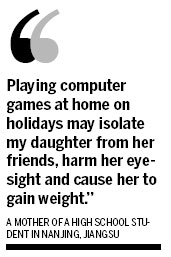Students use summer less for playing outdoors
Updated: 2011-07-27 07:35
By Cang Wei (China Daily)
|
|||||||||||
BEIJING - Although about 30 days have passed since the start of this year's summer holiday, Zong Zheng has only left his home in Nanjing, capital of East China's Jiangsu province, five times.
The boy, a 17-year-old in the 11th grade at a high school affiliated with Nanjing University, said he gets great enjoyment from reading comic books, collecting small pillows and logging onto the Internet to watch cosplay girls - real people who don costumes to look like fictional characters or celebrities.
Meanwhile, Liu Wenjia, a high school student at the Nanjing Foreign Language School, said she often uses her time away from classes to read books and play computer games.

"My classmates mostly spend their holidays in the same way," she said. "Few of them have asked me to go out."
To Song Yanhui, a researcher at the China Youth University for Political Sciences, such statements are not surprising.
"A growing number of young people on the mainland prefer to stay at home during summer holidays rather than do things outdoors," Song said.
"Many young people are used to being alone for a complex variety of reasons. Those include the isolated places where they live, the uninteresting extracurricular activities that are arranged for them by their schools and parents, and the fact that many of them are the only children in their families."
Sun Yunxiao, deputy director of the China Youth and Children Research Center, said children often end up staying at home because their parents have busy work schedules and are concerned about their safety.
Another reason is that many of their schools and parents have given them summer homework.
Sun said that 10 years ago only 50 percent of Chinese minors were being deprived of sleep by their studies. That figure has since increased to 80 percent, according to a survey that the research center conducted on students from rural and urban areas in 10 provinces.
Sun said the survey showed that most students are not satisfied with their holidays.
"I'm really worried about my daughter's being alone at home," said the mother of Liu Wenjia, who used to play all day with friends when she was a student. "Playing computer games at home on holidays may isolate my daughter from her friends, harm her eyesight and cause her to gain weight."
Researchers also worry that children who don't play outdoors with friends will not have fully developed personalities. Many students, though, do not take such concerns seriously.
"I do know that staying indoors for a long time is bad for my health, but I don't think it will isolate me from the outside world," Zong said. "You know, because there are lots of social networking websites and live chat programs."
Sun said: "To some extent, the Internet alleviates the isolation of children, but face-to-face communication, which entails the use of body language and the observation of other people's reactions, is crucial to the development of children's sensory organs."
He suggested that Chinese families and schools give children more opportunities to know about society, to broaden their horizons, and to lead a life during summer holidays that is completely different from the one they lead at school.
Song also said that children should be given free time to develop their interests in summer holidays, and that more places of recreation should be established.